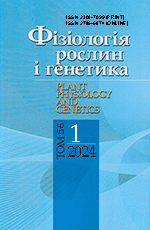Серед 26 колекційних сортів та ліній ячменю ярого виявлено цінні для різних напрямів використання зразки за комплексом агрономічних і біохімічних ознак. Схарактеризовано алельний стан генів Вту1, який визначає активність і термостабільність b-амілази, Lox-1, що детермінує синтез ліпоксигенази-1, Itr1, відповідального за наявність чи відсутність СМе-протеїну, та Wax, який кодує ключовий фермент синтезу амілози крохмалю ендосперму.
Ключові слова: ячмінь ярий, молекулярні маркери, ген Вту1, ген Lox-1, ген Itr1, Wax ген
Повний текст та додаткові матеріали
У вільному доступі: PDFЦитована література
1. Dospekhov, B.A. (1985). Field Experience Method. Moskow: Agropromizdat [in Russian].
2.The international classifier of the CMEA of the genus Hordeum L. (1983). Leningrad [in Russian].
3. Guidelines for the diagnosis and methods of field assessment of the resistance of barley to pathogens of leaf spot. (1987). Lenyngrad-Pushkin [in Russian].
4. Kobyilyanskiy, V.D. (Ed.) (1981). Guidelines for the study of the world collection of barley and oats. Leningrad [in Russian].
5. Methods of breeding and assessing the resistance of wheat and barley to diseases in the CMEA member countries (1988). Praga [in Russian].
6. Naumov, O.G., Kozachenko, M.R. & Vasko, N.I. (2014). Selection of Waxy Barley. Selektsiya i nasinnytstvo, 105, pp. 60-69 [in Ukrainian].
7. Stepanenko, A.I., Morgun, B.V. & Stepanenko, O.V. (2014). Distribution of alleles of the HvITR1 gene encoding the trypsin SME inhibitor (WHI-SME) and colloidal stability of beer among barley varieties registered in Ukraine. Biotechnol. Acta., 7 (6), pp. 75-82 [in Ukrainian]. https://doi.org/10.15407/biotech7.06.075
8. Stepanenko, O.V., Morgun, B.V. & Rybalka, O.I. (2014). Detection of allelic variants of the Wax gene among domestic and foreign barley varieties. Nauk. visti NTUU "KPI", No. 3(95), pp. 78-83 [in Ukrainian].
9. Stratula, O.R. & Sivolap, Yu.M. (2007). Alley characteristics of the b-amylase gene of barley varieties of Ukraine. Cytologiya i genetika, 41 (4), pp. 20-25 [in Russian].
10. Shaverskiy, A.A., Stepanenko, A.I. & Zholner, L.G. (2014). Investigation of allele polymorphism of bmy1 and lox-1 barley genes associated with brewer's grain characteristics. Nauk. visti NTUU "KPI", No. 3 (95), pp. 88-94 [in Ukrainian].
11. Brody, J.R. & Kern, S.E. (2004). History and principles of conductive media for standard DNA electrophoresis. Anal. Biochem., 333, pp. 1-13. https://doi.org/10.1016/j.ab.2004.05.054
12. Domon, E. (2002). The insertion/deletion polymorphisms in the waxy gene of barley genetic resources from East Asia .Theor. Appl. Genet., 104, pp. 132-138. https://doi.org/10.1007/s001220200016
13. Erkkila, M.J. (1999). Intron III specific markers for screening of b-amylase alleles in barley cultivars. Plant Mol. Biol. Rep., 17, pp. 139-147. https://doi.org/10.1023/A:1007595821379
14. Erkkila, M.J., Leah, R., Ahokas, H. & Cameron-Mills, V. (1998). Allele-dependent barley grain b-amylase activity. Plant Physiol., 117, pp. 679-685. https://doi.org/10.1104/pp.117.2.679
15. Fox G.P., Panozzo J.F. & Li ,C.D. (2003). Molecular basis of barley quality. Austr. J. Agr. Res., 54, pp. 1081-1101. https://doi.org/10.1071/AR02237
16. Hirota, N., Kaneko, T., Kuroda, H. & Kaneda, H. (2005). Characterization of lipoxygenase-1 nullmutants in barley. Theor. Appl. Genet., 111, No. 8, pp.1580-1584. https://doi.org/10.1007/s00122-005-0088-y
17. Modified Starches: Properties and Uses (1986). O.B. Wurzburg ed. Boca Raton, Fl.: CRC Press Inc.,
18. Sjakste, T. & Roder, M. (2004). Distribution and inheritance of b-amylase alleles in north European barley varieties. Hereditas, 141, 39-45. https://doi.org/10.1111/j.1601-5223.2004.01789.x
19. Stewart, C.N. & Via, L.E. (1993). A Rapid CTAB DNA Isolation technique useful for RAPD fingerprinting and other PCR. Appl. Bio Techniques., 14 (5), pp. 748-749.
20. Vinje, M.A., Duke, H.S. & Henson, C.A. (2010). Utilization of different Bmy1 intron III alleles for predicting b-amylase activity and thermostability in wildan and cultivated barley. Plant Mol. Biol. Rep., 28, (3), pp. 491-501. https://doi.org/10.1007/s11105-009-0168-2
21. Yang, G., Schwarz, P.B. & Vick, B.A. (1993). Purification and characterization of lipoxygenase isozymes in germinating barley. Amer. Assoc. Cereal Chem., 70, pp. 589-595.
22. Ye, L., Dai, F. & Qin, L. (2011). Allelic diversity of a beer haze active protein gene in cultivated and Tibetan wild barley and development of allelic specific markers. J. Agric. Food Chem., 59, pp. 7218-7223. https://doi.org/10.1021/jf200419k
23. Ye, L., Huang, L., Huang, Y. & Wu, D. (2014). Haze activity of different barley trypsin inhibitors of the chloroform/methanol type (BTI-Cme). Food Chem., 165, pp. 175-180. https://doi.org/10.1016/j.foodchem.2014.05.058
